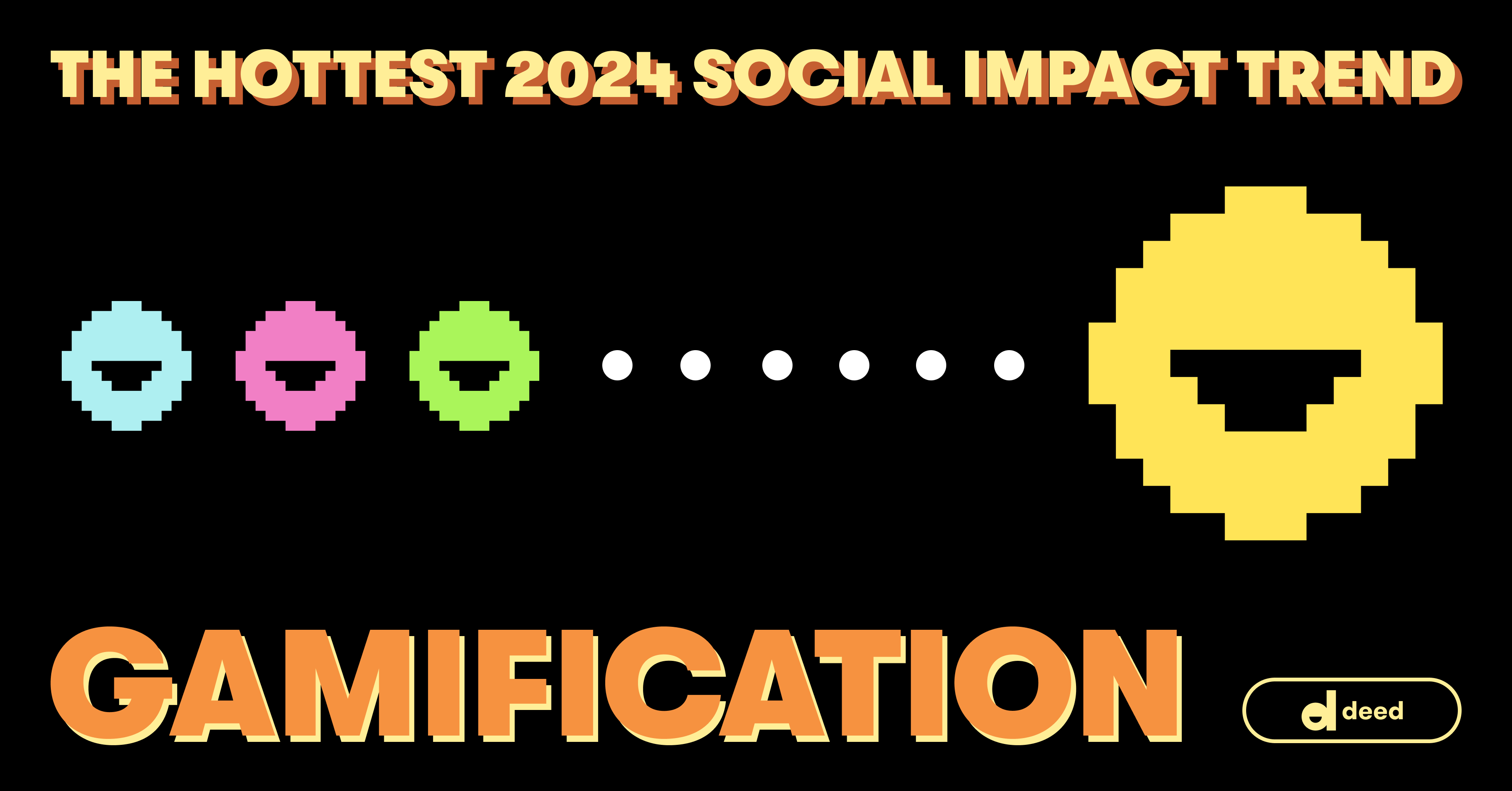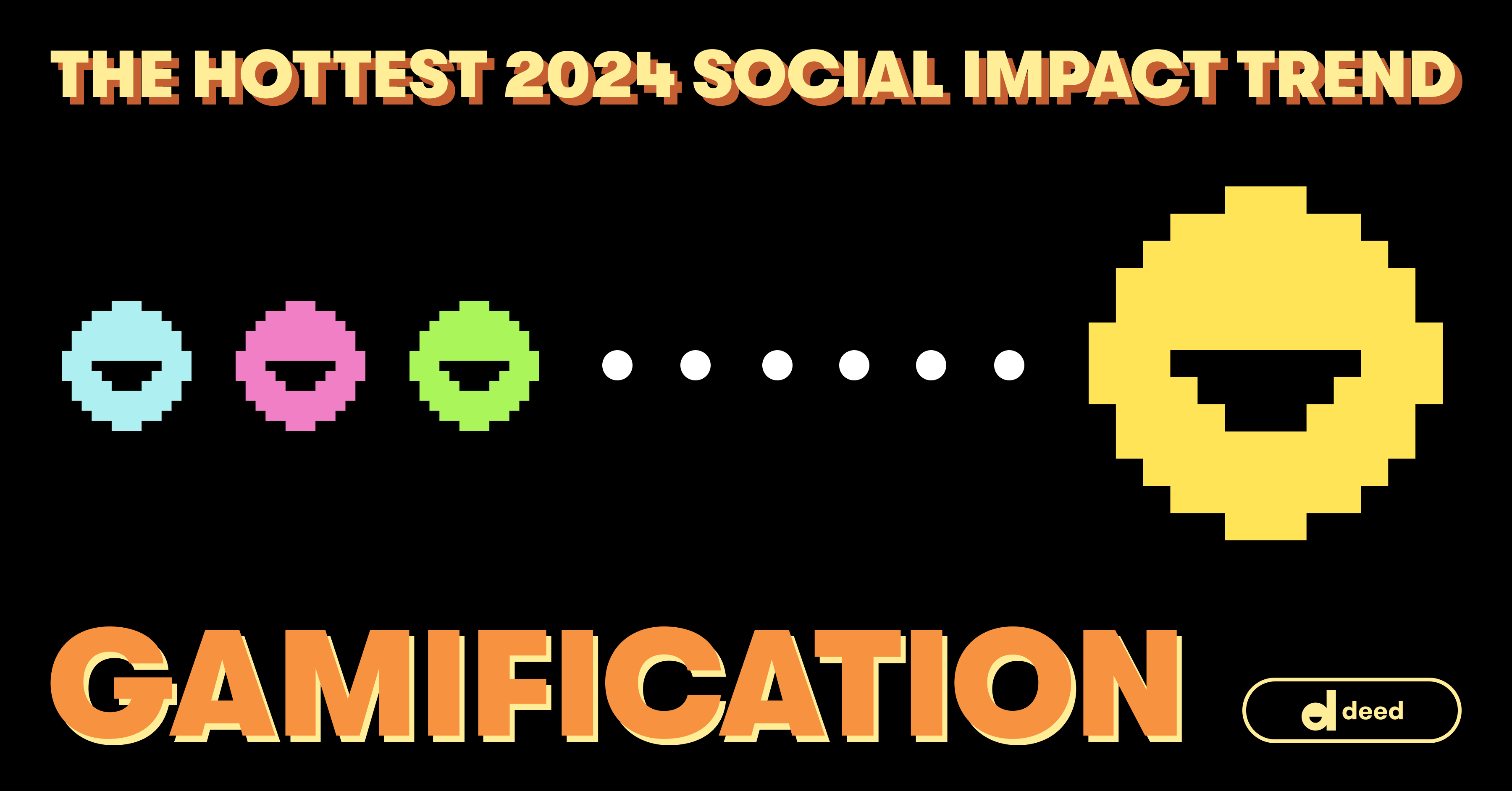Why Enterprise Companies are Gamifying Social Impact in 2024
Workplace giving and volunteering should be both meaningful and fun

Introduction
A new generation of design-focused platforms are nudging millions of people to form better habits.
Just think about the language learning platform Duolingo, which studies show has helped “nine out of 10 learners feel more confident speaking after one month.” Then there’s Headspace, a research-driven wellness platform that offers “meditation and mindfulness tools, mental health coaching, therapy, [and] psychiatry.” Independent research suggests that using Headspace for one month gives users three more productive days in that time. Strava, too, helps new and expert athletes reimagine what they are capable of. One long-time user expresses just how great that feels:
Commuting daily to and from work ought to be boring and repetitive, but Strava has helped turn each ride into a competition with myself to better my own results. I push myself to go harder and faster. I aim to get more PRs to prove that I’m getting better, and to prove to myself that the pain in my legs and lungs is worth it. Seeing the progression over time makes my desire even stronger.
In the world of corporate social impact, enterprise employees have provided an excellent use case for how gamifying workplace giving, and volunteering can boost engagement. Blockchain leader Ripple saw 78 percent employee participation by using social impact technology that helps build a lively community around doing good deeds. Gamification extends the reach of their social impact efforts and nourishes their service culture.
Here’s what I said in a recent webinar on the subject:
Let’s think about some of the basic reasons why gamification and social impact should go hand in hand. Then, we’ll review pro tips on how to make doing good deeds fun and easy for your employees.
Three reasons why gamification boosts employee engagement in social impact
1. More enjoyable to participate
Gamified workplace giving and volunteering technologies enhance employee engagement in social impact by making the process more enjoyable.
According to a study published in the journal Computers in Human Behavior, it’s the little nudges and rewards that people really enjoy. People don’t think about using an app in terms of “participating in gamification”—they’re just having fun and doing something good for themselves. The study shows that the individual elements like badges, leaderboards, and rewards are what bring users back and nudge them to reach their goals
Whether they know it or not, gamification taps into employees' intrinsic motivation and makes them more likely to participate in workplace giving and volunteering programs actively.
2. Motivation
Gamification is a powerful motivational tool that drives employee engagement in social impact initiatives. By including game mechanics, such as setting clear goals, earning badges, and receiving recognition, you can foster a sense of achievement and purpose.
In recent years, Deloitte has noted the increasingly common trend that gamification positively influences motivation by aligning individual and organizational goals, thus increasing employees' commitment to workplace giving and volunteering activities.
3. Community
Gamified technologies contribute to building a sense of community among employees engaged in social impact initiatives. One recent survey of nonprofit volunteerism shows that incorporating gamification elements into their volunteering platform helped create a vibrant online community.
The competitive and collaborative aspects of gamification encourage employees to connect, share experiences, and work together toward common social impact goals, fostering a strong sense of community within the workplace.
Pro Tips: How to make sure your workplace giving and volunteering platform is both useful and fun
Over the past five to 10 years, everybody’s expectations have changed for what role corporations need to play in generating positive social and environmental impact. Make sure your social impact technology is meeting your organization’s growing needs by offering these key features.
-
Badges
With virtual badges that celebrate dollars donated and hours volunteered, your employees can show off their good deeds and inspire healthy competition with their peers. Badges can celebrate everything from the first to the hundredth hour volunteered, or even participation on important days like Giving Tuesday.
-
Actions
Many social impact leaders now encourage bite-sized actions. These small acts of kindness—from switching to fair trade coffee to listening to a podcast about a social cause close to your heart—help employees take that first, crucial step toward sustained giving and volunteering.
-
Communities
From formal employee resource groups (ERGs) to loose teams committed to a shared cause, giving your team dedicated, virtual spaces to organize their programming is essential.
-
Leaderboards
Competition can be a good thing, especially when it’s all in good fun. Your employees will be more engaged when they are focused on competing with colleagues to see who can donate or volunteer the most to a cause you all genuinely care about.
-
Rewards
Celebrating your employees’ volunteer efforts with donation credits they can use to make an even bigger impact will help them feel like their contribution really matters. Plus, they’ll be more likely to share their time, money, and talent again.
-
Volunteer Time Off
Did you know that leading HRIS providers like Workday can be fully integrated with your social impact technology? This enables you to give your employees special time-off days to volunteer in their communities. This makes your program more inclusive, and gives your employees the time to really disconnect from their day-to-day tasks and focus on helping others.
Final thoughts
When you hear the word “gamification” you might remember childhood trips to the arcade or look forward to settling down with your video game console this weekend. But gamification is also a concrete strategy that global enterprises use to help their employees form better habits, from learning a new language to health and wellness and even workplace giving and volunteering.
From Ripple to Airbnb, the organizations that take their social and environmental impact seriously aren’t afraid to have fun. In fact, they encourage it.
According to Ripple’s Jonathan Perri, Senior Manager of Global Social Impact, switching to Deed “gave Ripple the opportunity to not just restructure the program, but to reimagine its approach to employee impact.”


